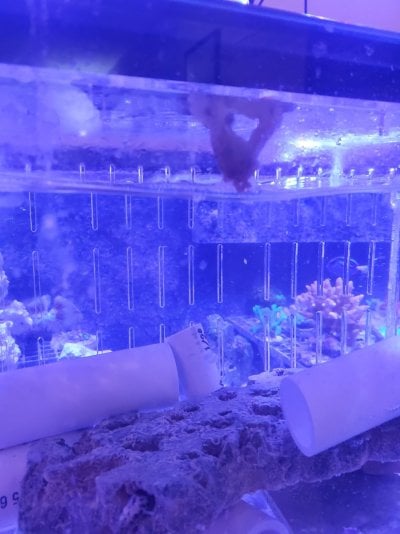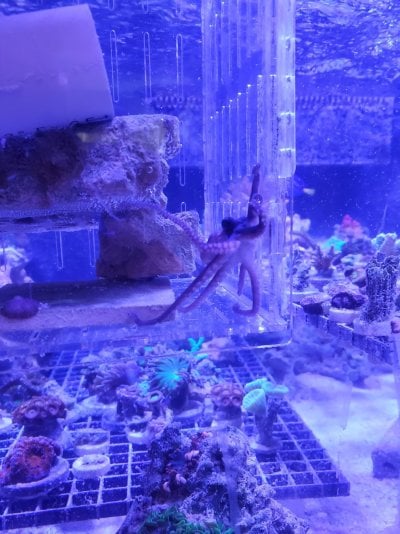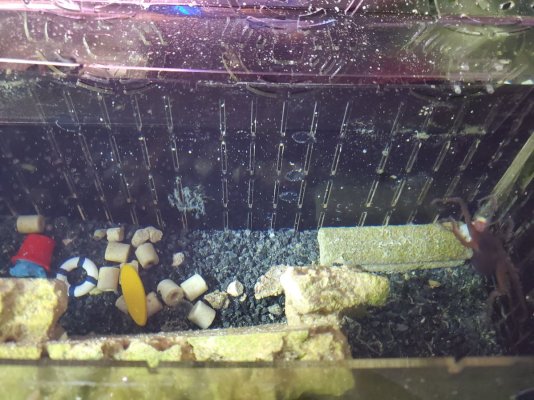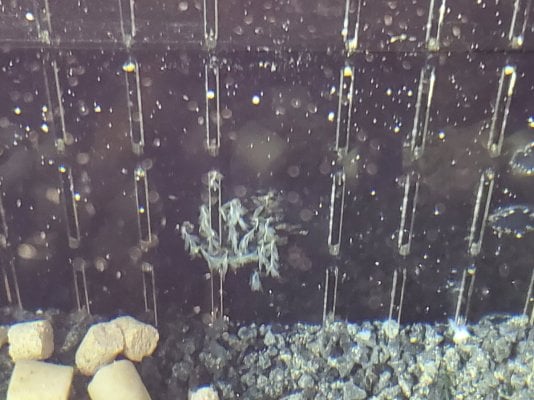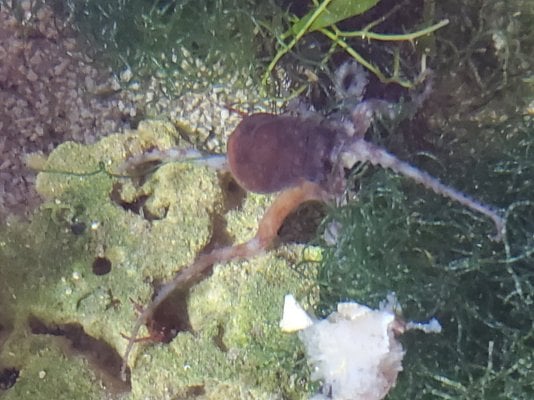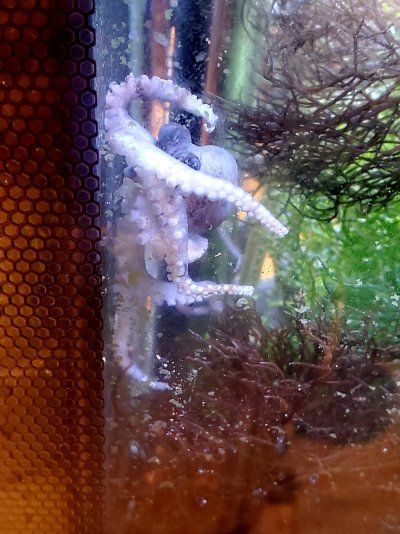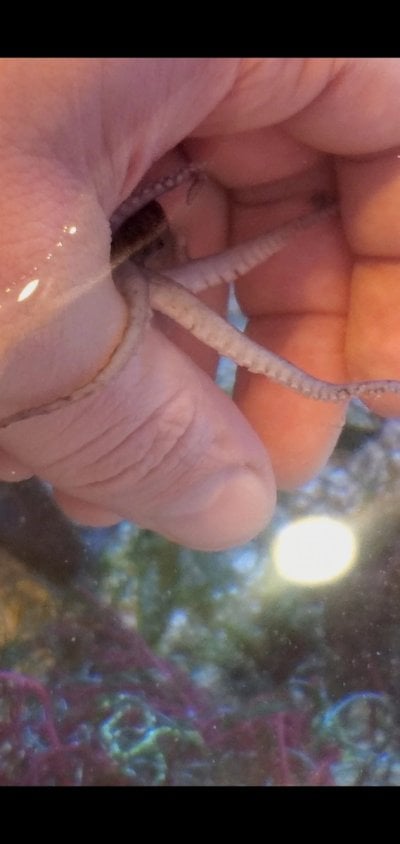Navigation
Install the app
How to install the app on iOS
Follow along with the video below to see how to install our site as a web app on your home screen.
Note: This feature may not be available in some browsers.
More options
You are using an out of date browser. It may not display this or other websites correctly.
You should upgrade or use an alternative browser.
You should upgrade or use an alternative browser.
Octopus has eggs - any info or tips?
- Thread starter mc-nuggs
- Start date
-
- Tags
- eggs invert care octopus
- Tagged users None
The update I've been avoiding-- pretty sure all paralarve died by Thursday at midnight. I checked all 3 tanks at that time for paralarvae and could not spot a single one.
Main takeaway: you have maybe 2 to 3 days after octopus paralarvae hatch to get them to eat something. I would have thought that this timespan would be up to a week, but it is much shorter than that. I'm curious to know if this timespan is longer for large-egg octopus species. Regardless, this short timespan, and not knowing exactly when the eggs will hatch probably poses the largest tactical issue in securing their survival. You have to have live prey on hand and ready to go on day one. According to academic journals, adult brine shrimp are viable.
There are maybe 5-10 eggs remaining which have yet to hatch. I opened up Nugward's nest with the intention to re-house her so she wouldn't be guarding an empty nest for her remaining life, and that's when I saw it was not completely empty. I could see their eyes glinting inside the eggs, so I might have anywhere from 1 - 7 days before they hatch, if I had to guess. Nugward rejected another meal, so it has been a week since she has eaten.
I'm raising a batch of brine shrimp, isolated in a 5 gallon bucket. I'm hoping to have adults by the time the paralarvae hatch; we'll see. I have tig pods in another 5 gallon bucket and I've enriched both buckets with phytoplankton. I don't think that the tig pods will be suitable prey, probably too small.
Other notes: The tide pods were a good idea, but not the way they were welded at the bottom. I noticed the paralarvae would get caught/stuck between the two mesh sides at the bottom. I would make them more of an inverted cone or pyramid at the bottom, with open space. Also, make sure you don't have any folds, or gaps under the styrofoam. I saw prey and paralarvae swimming up and getting wedged in those places. Also, don't put anything like charcoal in them-- the charcoal was so light that whenever I would move a pod which had it at the bottom, it would fly up and sometimes bury the paralarvae or other prey. It would also make it harder to locate the paralarvae and prey within the pod.
I did try feeding paralarvae under dark conditions. I didn't include that in the video b/c the footage was just black ;-)
All tanks had brine shrimp, amphipods, mysid shrimp, free-roaming paralarvae and air stones. Again, aside from having adult brine shrimp on hand (or snow crab larvae, but good luck there), I'm not sure what more could have been done.
Monday morning was literally the worst day of the week for them to hatch. A Friday would have been optimal. I would have had a weekend of available time to monitor and try different things. I can't put into words how soul-crushing this last week has turned out. This is definitely the reason why similar octo-egg threads go silent. Hopefully the last few paralarvae will do better when they hatch, but they probably won't! I'm still committed to doing everything I can to help them survive, and will continue to document everything here.
Also, how funny-awesome would it have been if coral aminos was the secret food no one had tried? Can you imagine? "Yeah, they just suck up these coral aminos from the water and I have 90% survival rates at 60 days. Then I just feed them frozen dungeoness crab cause their adults." XD
Main takeaway: you have maybe 2 to 3 days after octopus paralarvae hatch to get them to eat something. I would have thought that this timespan would be up to a week, but it is much shorter than that. I'm curious to know if this timespan is longer for large-egg octopus species. Regardless, this short timespan, and not knowing exactly when the eggs will hatch probably poses the largest tactical issue in securing their survival. You have to have live prey on hand and ready to go on day one. According to academic journals, adult brine shrimp are viable.
There are maybe 5-10 eggs remaining which have yet to hatch. I opened up Nugward's nest with the intention to re-house her so she wouldn't be guarding an empty nest for her remaining life, and that's when I saw it was not completely empty. I could see their eyes glinting inside the eggs, so I might have anywhere from 1 - 7 days before they hatch, if I had to guess. Nugward rejected another meal, so it has been a week since she has eaten.
I'm raising a batch of brine shrimp, isolated in a 5 gallon bucket. I'm hoping to have adults by the time the paralarvae hatch; we'll see. I have tig pods in another 5 gallon bucket and I've enriched both buckets with phytoplankton. I don't think that the tig pods will be suitable prey, probably too small.
Other notes: The tide pods were a good idea, but not the way they were welded at the bottom. I noticed the paralarvae would get caught/stuck between the two mesh sides at the bottom. I would make them more of an inverted cone or pyramid at the bottom, with open space. Also, make sure you don't have any folds, or gaps under the styrofoam. I saw prey and paralarvae swimming up and getting wedged in those places. Also, don't put anything like charcoal in them-- the charcoal was so light that whenever I would move a pod which had it at the bottom, it would fly up and sometimes bury the paralarvae or other prey. It would also make it harder to locate the paralarvae and prey within the pod.
I did try feeding paralarvae under dark conditions. I didn't include that in the video b/c the footage was just black ;-)
All tanks had brine shrimp, amphipods, mysid shrimp, free-roaming paralarvae and air stones. Again, aside from having adult brine shrimp on hand (or snow crab larvae, but good luck there), I'm not sure what more could have been done.
Monday morning was literally the worst day of the week for them to hatch. A Friday would have been optimal. I would have had a weekend of available time to monitor and try different things. I can't put into words how soul-crushing this last week has turned out. This is definitely the reason why similar octo-egg threads go silent. Hopefully the last few paralarvae will do better when they hatch, but they probably won't! I'm still committed to doing everything I can to help them survive, and will continue to document everything here.
Also, how funny-awesome would it have been if coral aminos was the secret food no one had tried? Can you imagine? "Yeah, they just suck up these coral aminos from the water and I have 90% survival rates at 60 days. Then I just feed them frozen dungeoness crab cause their adults." XD
Last edited:
I know eventually they would kill each other but not sure when that would be. Maybe try a few together and cannibalism might help for one to survive if they aren't eating the food provided.
I've never had issues with Nugward trying to escape, with one exception. I didn't know that other fish in the same aquarium would stress octopus out, and I caught glimpses of Nugward hanging upside down, outside of the water, on the ceiling of the quarantine box. This was a few hours after she arrived. It was at this point I found one of @Thereefdoc 's videos mentioning the fish-stress factor and I had the idea to glue blackout tint to the box (and slice holes in the plastic tint sheet for flow), and Nugward was fine after that. She arrived with one arm missing, but it was almost totally grown back one month later.How long is Nug by herself with you at work? Never tries escaping?
Oddly enough, I had this same thought. It was one of the reasons I had 2 paralarvae in the same container when trying to get them to feed. That and it increased the chances that I would at least see one feeding. Unfortunately, they don't seem keen on eating each other (or anything else) from what I've observed.I know eventually they would kill each other but not sure when that would be. Maybe try a few together and cannibalism might help for one to survive if they aren't eating the food provided.
Attachments
Found a paralarvae floating around in the quarantine enclosure around midnight this morning. Must have been one of the latest to hatch. Made another feeding attempt. It didn't eat anything. I tried brine shrimp and 2 tig copepods. Would have tried other stuff, but I had popped my sleep meds around 11pm and was starting to black out at the microscope. Put the paralarvae back in the tank. Haven't seen it at all today. Still growing/breeding copepods and brine shrimp.
Who wants to bet I'll wake up tomorrow and see the rest of them hatched on another Monday morning?
Who wants to bet I'll wake up tomorrow and see the rest of them hatched on another Monday morning?
Very interesting topic. I would like to draw attention to one point. The larvae do not want to take food. The author of the topic thinks that he did not please them with food. But the larvae are sitting in an empty glass or jar. They don't feel safe and won't accept food. Take an adult fish, put it in an empty jar and try feeding it. The fish will not eat. The larva will do the same. It is scared in an open space with nowhere to hide from danger.
No eggs remain. I pulled the large rock away from the wall and attempted to feed Nugward. She refused. Took down the nest. Nugward is housed in the same 13.5 gal tank w/out the quarantine box.
Depressing. Will upload a video with my thoughts at some point. Thanks everyone for all the advice + enthusiasm, sorry things didn't turn out better.
Depressing. Will upload a video with my thoughts at some point. Thanks everyone for all the advice + enthusiasm, sorry things didn't turn out better.
Attachments
Nugward died today (24 NOV 2023). Interesting note on behavior, she still rejected food (last known meal was 2 weeks ago on NOV 10), but seemed to like human interaction again, after the eggs were gone. She would grab my finger or hand and refuse to let go! Also, her mantle was looking deformed, like it had a large dent on one side, and she seemed whiter or greyer than usual.
Fascinating pet. Surprisingly intelligent. Will get one again at some point in the future. Attached pictures are from earlier today.
Fascinating pet. Surprisingly intelligent. Will get one again at some point in the future. Attached pictures are from earlier today.
Attachments
No - octopuses are semelparous creatures, meaning that after they mate (males) or lay eggs (females), they die.* More specifically, they stop eating, don’t move much, and slowly waste away (amongst a few other symptoms). They produce hormones upon laying eggs that cause them to do these things, so to prevent them from wasting away (and caring for the eggs), you have to remove the gland (called the optic gland) that produces the hormones.**Do you think that she would have continued eating if immediately separated from the eggs? Would she would have died, of old age, regardless of eating or not?
*Source:
**Source:
Similar threads
- Replies
- 8
- Views
- 350
- Replies
- 3
- Views
- 242
- Replies
- 11
- Views
- 717




